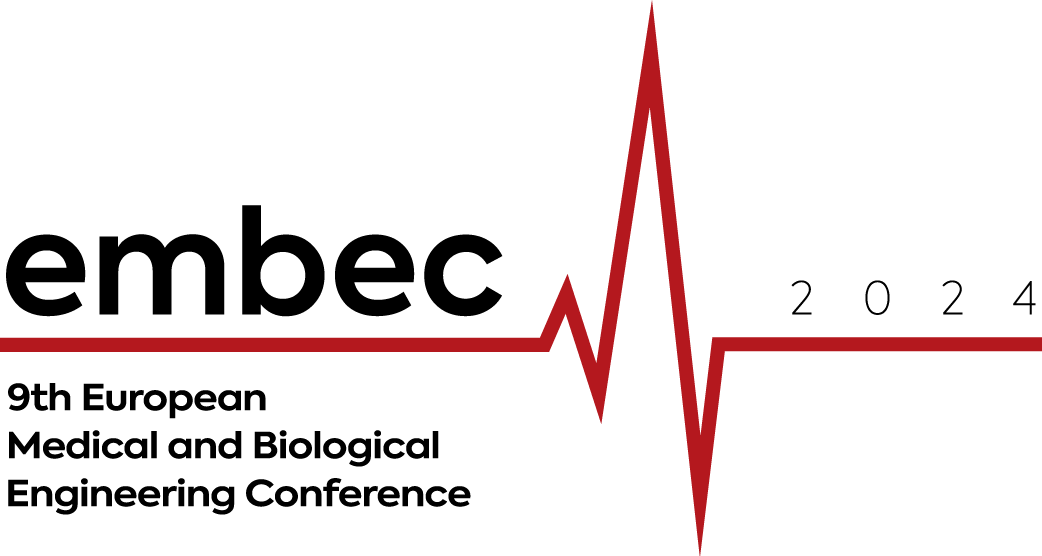Page Contents
- S01 – Advanced Health Technology Assessment of Wearable Devices: A Comprehensive Evaluation
- S02 – Advances in BME in the Asia Pacific Region
- S03 – Applications of Entropy in Health Care
- S04 – Bringing medical device from idea to the market; Integration of legal requirements in the process
- S05 – Certification and Integration of Technical Tools in Social Care
- S06 – Early career and competency development
- S07 – Electrochemical Effects in Bioelectrical Therapies
- S08 – Electroporation for treatment of cardiac diseases
- S09 – Health Technology Assessment of Medical Devices – Advances and Challenges
- S10 – Health Technology Management in Africa
- S11 – IFMBE Education in BME Session: Education in Biomedical Engineering for Students
- S12 – Intelligent Health Monitoring for Precision Medicine: A Global Perspective
- S13 – Multimodal data fusion to better understand multimorbidity
- S14 – Non-invasive methods for monitoring electrophysiological and hemodynamic brain activity (Symposium)
- S15 – Optimizing Healthcare: Patient-Centered Technology Innovations
- S16 – Out-of-the-lab dry EEG
- S17 – Regulatory Learning
- S18 – Space & Security
- S19 – Special Session of the IFMBE Industry Committee: Medical Technologies – From Concept to Commercialization
- S20 – System design for biomagnetic applications using optically pumped magnetometers (Symposium)
- S21 – The role of Large-Language Models and Generative AI in Health Technology Management [This session is joined with S23]
- S22 – Tools, technologies and computing for point-of-care person-centered health and care delivery
- S23 – Uncertainty in integration of new medical technologies into health care systems [This session is joined with S21]
- S24 – Wireless Wearable Networks for Physical Function Rehabilitation Monitoring
- S25 – IFMBE Education in BME Session: Challenges in Accreditation of Biomedical Engineering Programs in Latin America
- S26 – IFMBE Education in BME Session: Transformation of the BME Education in Asia Pacific Region
- S27 – Perspectives of BME Education
- S28 – BME Education in Europe
- S29 – Presentation of WHO project – Update of CMMS and Inventory publication
S01 – Advanced Health Technology Assessment of Wearable Devices: A Comprehensive Evaluation
Conveners/Organizers
Fabiola Martinez, Murilo Conto, and Paulo de Carvalho
Description
The special session, “Advanced Health Technology Assessment of Wearable Devices: A Comprehensive Evaluation,” thoroughly explores the evolving field of wearable health technologies. In this session, we go beyond standard evaluations to provide a thorough examination of the methodologies, data analytics, and clinical implications associated with these cutting-edge devices. Wearable health technologies have transformed how we monitor and manage our health, from fitness trackers and smartwatches to sophisticated medical-grade devices. With the ever-expanding range of available wearables, assessing their efficacy and integration into healthcare systems is paramount. During this special session, we will cover various topics, including novel assessment techniques, real-world data analysis, and the clinical relevance of wearable devices. We aim to give participants a deeper understanding of how wearables revolutionize the healthcare landscape and the intricate processes involved in evaluating their impact. The session will serve as a platform for multidisciplinary discussions, allowing experts from various fields to share their valuable insights and foster innovative ideas. It is designed to be an invaluable resource for researchers, clinicians, engineers, and healthcare professionals interested in the vast potential of wearable health technology and the rigorous assessment criteria needed to maximize its effectiveness and integration within healthcare systems.
S02 – Advances in BME in the Asia Pacific Region
Conveners/Organizers
James Goh and Ichiro Sakuma
Description
Technological research and development is growing at a rapid phase in the Asia Pacific region. This is particularly true in the field of Biomedical Engineering. One reason for this growth is that by 2030, the region is estimated to be home to over 60% of the world’s population, with a significant proportion being aged 60 or older. Factors such as rising healthcare costs, an aging demographic, and an increase in chronic diseases also contribute to this growth trajectory. Currently, the Asia-Pacific region represents 18% of the approximately $660 billion global Medtech industry and is projected to be the fastest-growing region, with a 9% compound annual growth rate over the next five years. This special symposium brings together some of the top researchers from across the Asia Pacific region to share their latest cutting-edge research, ranging from the imaging technology, AI-driven diagnosis to medical robotics and others.
S03 – Applications of Entropy in Health Care
Conveners/Organizers
Alexander Martynenko
Description
Entropy, a concept derived from thermodynamics and information theory, has diverse applications in healthcare. It plays a crucial role in medical imaging for identifying abnormalities, aids in neurology by analyzing brain signals, helps design prosthetics through biomechanical analysis, contributes to drug discovery, improves patient data analysis, optimizes healthcare systems, and supports genetics research. It also ensures quality control in pharmaceuticals, monitors patient health, and enables predictive healthcare analytics. Entropy is a valuable tool in healthcare, benefiting diagnosis, treatment, and research.
S04 – Bringing medical device from idea to the market; Integration of legal requirements in the process
Conveners/Organizers
Peter Kramar and Ana Pribaković Borštnik
Description
To be placed on the market, medical devices must comply with legal requirements, which include also management system requirements. according to Regulation (EU) 2017/745. Researchers and manufacturers must identify these requirements already in early stages of the design and development of a medical device in order to avoid changes and adaptations of product in later stages and delayed placement on the market. Within the section, the experiences of researchers, developers, manufacturers, certification bodies and consultants will be exchanged.
S05 – Certification and Integration of Technical Tools in Social Care
Conveners/Organizers
Vit Janovsky
Description
The section aims to provide a forum for experts in social care, technology, and certification processes to explore how advanced technical tools can enhance and streamline the delivery of social care services. This section will emphasize the importance of certification, quality assurance, and the integration of innovative technology solutions into the social care ecosystem. Here are some subtopics:
- Assistive Technology and Social Care: Present the latest developments in assistive technologies designed to improve the quality of life and care for individuals with diverse social care needs.
- Certification Standards and Procedures: Discuss the certification processes and standards required for ensuring the safety, effectiveness, and ethical use of technical tools in the social care sector.
- Digital Health Records and Privacy
- Innovative Solutions for Social Inclusion
- Smart Homes and IoT Integration in homes and senior houses.
- Remote Monitoring and Telecare
- Certification Case Studies
- Ethical Considerations and User-Centered Design: Delve into the ethical implications of adopting technology in social care, emphasizing the importance of user-centered design and patient-centric approaches.
- Professional Training and Education: Examine the role of education and training programs in ensuring that social care professionals are equipped to use certified technical tools effectively.
- Regulatory Frameworks and Compliance.
S06 – Early career and competency development
Conveners/Organizers
Fredrik Nikolajeff
Description
Challenges with early career moves may include developing a self-belief, building confidence, increasing the visibility and networking. This special session aims to bring together experienced as well as younger scientists and professionals to share their experience on the topic, and enable a better understanding of best practice in promoting talented graduated student to work in the field of medical and biological engineering. Furthermore, a focus will also be on competency development and how to increase the attractiveness of medical and biological engineering for talented people The target group will be pan-European professionals and students, and moderated by Councillors from the EAMBES working group of Education and Early Career.
S07 – Electrochemical Effects in Bioelectrical Therapies
Conveners/Organizers
Antoni Ivorra and Samo Mahnič-Kalamiza
Description
This special session is intended to explore the intricate interplay between electrochemical processes and cutting-edge bioelectrical therapies.
The session is poised to attract researchers, scientists, and practitioners from diverse disciplines who are keen to delve into the fascinating world where chemistry and electricity converge to shape the future of healthcare. Electrochemical reactions can be an adverse collateral phenomenon in some bioelectrical therapies, but they can also be a fundamental aspect of some other bioelectric therapies. The session will explore both perspectives.
While the scope of the session will be general and involve all aspects and applications in biomedicine where electrochemistry is of importance, there are a few spotlights we have foreseen.
One spotlight will be on electroporation. Attendees can expect cutting edge presentations on electrochemical phenomena related to electroporation in biomedicine. We will review advancements in modelling electrochemistry during pulse delivery and our understanding of the interplay between waveforms and pH.
Another focus will be on neuroprosthetics, including brain-machine interfaces. Within this context, the session will delve into the critical role of electrochemical effects in the development and functioning of neuroprosthetic devices. We can expect an exploration of how the interplay between electrodes and neural tissues influences the performance, longevity, and biocompatibility of implantable devices.
S08 – Electroporation for treatment of cardiac diseases
Conveners/Organizers
Lea Rems
Description
Cardiovascular diseases are the No. 1 healthcare challenge in the world, among which ischemic heart disease and atrial fibrillation are the most prevalent. Irreversible electroporation is showing tremendous potential for treatment of atrial fibrillation, enabling a safer and shorter treatment procedure compared with existing thermal ablation approaches. Moreover, recent pioneering studies provide evidence that reversible electroporation can be used as a nonviral vector for intracellular delivery of therapeutic nucleic acids that promote cardiac regeneration, potentially offering a way to cure the so-far incurable ischemic heart disease. The aim of this section is to provide an overview on the state-of-the-art knowledge and share the experience among researchers and clinicians on the aspects of using electroporation for treatment of cardiac diseases.
S09 – Health Technology Assessment of Medical Devices – Advances and Challenges
Conveners/Organizers
Murilo Contó and Ernesto Iadanza
Description
This special session will be cover the recent advances related to HTA in medical devices, including new approaches such as Artificial Intelligence, Sentiment Analysis and the last version of the book “HTA of Medical Devices” published by World Health Organization. The panelists are experts and will speak from different perspectives (academia, hospital, government, industry and international organization).
S10 – Health Technology Management in Africa
Conveners/Organizers
Ashenafi Hussein
Description
Health Technology Management (HTM) is a huge task which needs knowledge, skill, infrastructure and system. All these four key parameters are the challenges in Africa. There are countries where all the parameters are not fulfilled, partially fulfilled or poorly fulfilled. Knowledge and skill from BME/ CE professionals is still at the early stage. Infrastructure especially during installation, maintenance and decommissioning are a real problems. When we see system aspect such as supply chain system and regulatory system, it is almost the unseen area in Africa. Holistic approach in such parameters may improve, if not change, the way HTM is done in Africa.
S11 – IFMBE Education in BME Session: Education in Biomedical Engineering for Students
Conveners/Organizers
Martha Zequera Diaz, Ratko Magjarevic and Shankar M. Krishnan
Description
Activity organized by: IFMBE Education & Accreditation Committee (E&A), IFMBE Students & Recent Graduates Working Group (S&RG-WG) and the organizers of Embec2024. The session is oriented to the exchange of academic and professional experiences by a group of invited panelists in the field of Biomedical Engineering and Bioengineering. Esteemed members of IFMBE will collaborate as moderators for the session. This engaging discourse will feature by five students and early-career professionals representing different nations (Europe, USA, Latin America, and Asia), each offering unique insights into the realm of Biomedical Engineering. They will delve into their distinct perspectives, challenges, and experiences within the field, elaborating on its diverse applications within their respective countries. This panel is about exchange of students and recent graduates’ experiences in studying BME by early-career professionals. The chair and co-chair of this session will ask guiding questions to each of the panelists during the session, in sequential order, and after all the chair and co-chair will make a summary of the most relevant aspects that each panelist highlighted per question, finally the audience will be invited to ask questions to the panelists. The main topic of this special session is to present Innovation applications in digital biomedical signal processing for Improving the design of medical devices.
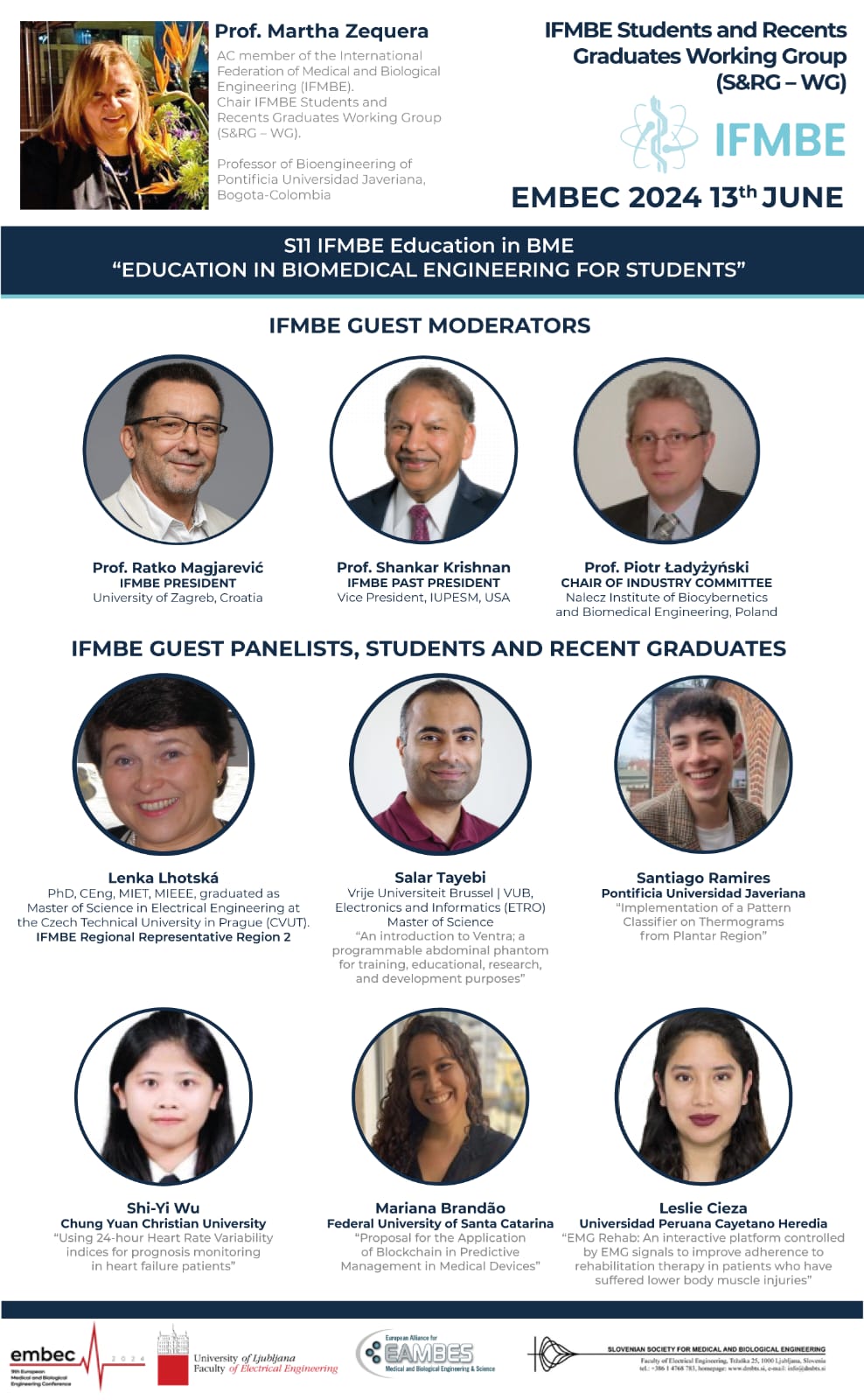
S12 – Intelligent Health Monitoring for Precision Medicine: A Global Perspective
Conveners/Organizers
Li Li
Description
This half-day workshop is organized by the Chinese Society of Biomedical Engineering and is geared toward graduate students, young researchers and enthusiasts entering the field of Health Monitoring. In the era of rapid AI developments, the health monitoring domain is undergoing a considerable transformation. Recent advances in wearables, ubiquitous perception and Internet of Things (IoT) devices, has led to an explosion of routinely collected individual health data. The integration of these techniques with Artificial Intelligence (AI) has paved the way for Precision Medicine 2.0, a groundbreaking approach that holds the promise of revolutionizing patient care.How to enhance the clinical efficiency and individual benefit from the massive data and AI methods, and how to improve the rationality and interpretability of AI algorithms in practical applications, are the focus of current research.The purpose of this workshop is to provide a platform for discussing the latest progresses, such as AI approaches, wearable device development, feature engineering and computational intelligence techniques for intelligent health monitoring, and exploring the new solutions, with an emphasis on how these methods can be efficiently used for precision medicine, from a global perspective.
S13 – Multimodal data fusion to better understand multimorbidity
Conveners/Organizers
Péter Antal
Description
Integration of heterogeneous information has always been a vital focus in life sciences, for example, the integration of omic data sets. The growing availability of electronic patient records, patient registries, and biobanks provides an unprecedented amount of heterogeneous data to learn latent patient representations, stratify patients, subtype diseases, and explore common molecular factors behind multimorbidities. After probabilistic graphical models, statistical relational learning, kernel fusion, network propagation, and graph neural networks, transformers emerged as powerful methods for multimodal data fusion. However, quantitative information, time series data, and systematically missing modalities still pose problems for the applicability of transformers. The special section expects works for novel methods in multimodal data fusion, especially to improve our understanding of multimorbidity and polypharmacy. Evaluation and comparison of methods on available public benchmarks is especially encouraged.
S14 – Non-invasive methods for monitoring electrophysiological and hemodynamic brain activity (Symposium)
Conveners/Organizers
Vojko Jazbinšek, Tillman Sander, and Stanislaw Wojtkiewicz
Description
Brain activity can be evaluated noninvasively by measuring either the electrical activity of nerve cells or changes in blood oxygenation and blood flow in vessels. Electrophysiological methods include electroencephalography (EEG) or magnetoencephalography (MEG). The hemodynamic methods include functional magnetic resonance imaging (fMRI), functional near-infrared spectroscopy (fNIRS) or transcranial Doppler ultrasound (TCD). A multimodal combination of both approaches can offer comprehensive insight into brain functions and activity. It enables researchers and clinicians to correlate electrical activity with changes in blood flow and oxygenation. Particularly, it applies to: • improving spatiotemporal tomographic reconstruction, • development of quantitative measures of neurovascular coupling function, • investigating activations of brain regions under cognitive or emotional tasks, experiments in cognitive neuroscience, • improving clinical diagnosis of neurological and psychiatric disorders providing detailed insights into brain functions and abnormalities, • improving the performance of brain-computer interfaces. This symposium aims to connect experimental and theoretical research utilizing the abovementioned methods. The objective is to identify and set new directions for multimodal imaging, parameters recovery and modelling. To serve future diagnostic applications, a focus is set to the balance between information gain and experiment complexity.
S15 – Optimizing Healthcare: Patient-Centered Technology Innovations
Conveners/Organizers
Paulo de Carvalho, Fabiola Martinez, and Murilo Conto
Description
The special session, “Optimizing Healthcare: Patient-Centered Technology Innovations,” serves as an insightful exploration of the progressive role of technology with a strong emphasis on the patient’s well-being in the contemporary healthcare landscape. The session is designed to bring together a diverse group of experts, innovators, healthcare practitioners, and researchers to delve deeply into the transformative potential of patient-centric technologies. The discussion covers various aspects, including how these technologies empower individuals to take an active role in managing their health, the profound influence of telemedicine, wearable devices, and digital health records in reshaping healthcare delivery, and the critical considerations surrounding patient privacy and data security in the digital age. Through compelling real-world case studies, the session will provide tangible examples of how patient-centered technology is effectively integrated into healthcare practices. Moreover, the session will explore emerging trends that are redefining healthcare, offering participants a comprehensive view of the role of technology in enhancing patient care. It’s an opportunity for a robust exchange of ideas, knowledge sharing, and an in-depth exploration of the dynamic and evolving field of patient-centered technology within the healthcare ecosystem.
S16 – Out-of-the-lab dry EEG
Conveners/Organizers
Jens Haueisen and Patrique Fiedler
Description
The aim of the special session “Out-of-the-lab dry EEG” is to present and discuss advances in technologies and applications for neuromonitoring in real-world situations outside conventional laboratory or clinical settings. We will address innovations in sensors, sensor applicators, signal enhancement and analysis methods. The proposed special session comprises talks from different international groups, conjointly aiming to transfer and promote their developed technologies and techniques based on electrophysiological signal acquisition and analysis to the greater scientific public. Therefore, each of the talks will address the impact and translation perspectives of the presented results under conditions involving mobile, emergency and/or home-based applications. We will focus on the important challenges, recent advances and next steps in the related research. Specifically, we will discuss latest research on i) dry EEG sensors and validation; ii) caps and headsets for individualizable low-density and high-density array measurement; iii) methods for bad channel and artifact detection and reduction; iv) applications of dry EEG in sports science, emergency and / or home use. Ultimately, we will explore how these recent advances can pave the way for future wide use. The special session aims to address neuroscientists, engineers and computer scientists interested in the aforementioned topics. We foresee 6 talks and a panel discussion.
S17 – Regulatory Learning
Conveners/Organizers
Giuseppe Fico
Description
Living Labs represent a space for experimentation to learn about complex, highly specific topics tied to the other actors of the quadruple helix. In this sense, the Joint Research Centre of the European Commission in the report “Regulatory Learning in Experimentation Spaces” indicated how Living Labs, as an experimentation space, can support decision-making and learning about regulatory aspects.
The health sector is undoubtedly the most regulated industrial sector, and therefore, regulatory, legal, and ethical aspects are covered in many areas of biomedical engineering.
Therefore, this model could be adopted to learn mutually and collaboratively with other actors in the ecosystem. The Living Lab and Open Innovation model is being currently used in European reference Large ScalePilot GATEKEEPER and ODIN, defining innovative digital health services for the care and hospital of the future. working with reference actors from the quadruple helix, including experts in regulation.
This session will include perspectives on forthcoming regulatory landscape in health care, with reference on the HTA regulation, the new MDR, the GDPR, the EHDS among others.
S18 – Space & Security
Conveners/Organizers
Patrik Kutilek
Description
Currently, medical technology in the area of space & security is developing very quickly. In the case of R.& D., it is a multidisciplinary problem taking into account measurement and processing of biomedical, environmental and simulator data, use of AI, optimization of technologies with regard to the human factor and safety, design of assistive technologies. The uniqueness of medical technologies for space & security is that they require specific characteristics resulting from the characteristics of the demanding and danger environments where these technologies are used. These are, for example, higher mechanical resistance, wearability or portability, low weight, resistance to signal interference, long-term use, use of ICT to transfer and process data remotely in real time, etc.
S19 – Special Session of the IFMBE Industry Committee: Medical Technologies – From Concept to Commercialization
Conveners/Organizers
Piotr Ladyzynski and Martha Zequera Diaz
Description
The evolving landscape of health technology demands a concerted effort from all stakeholders to enhance healthcare quality and value without imposing increased costs or burdens on healthcare professionals. Innovations, from digital health to advanced therapy medicinal products, pose multifaceted challenges that require a multidisciplinary approach.
The goal of this special session is to present a comprehensive review of the challenges involved in progressing medical products and services from concept to commercialization within the dynamic health technology industry. This session highlights the pivotal role played by collaborations among academia, the MedTech industry, and healthcare professionals. Such collaborations are essential for stimulating innovation, comprehending practical healthcare requirements, and translating concepts into impactful solutions. Participants will gain invaluable insights into leveraging these collaborations to propel advancements in medical technology.
The session will feature presentations and a panel discussion involving experts from academia, the MedTech industry, and representatives of the European Commission, fostering a platform for robust discussions and shared insights.
A central theme of our discussion will be the intricate journey from conceptualization to marketable products. This involves navigating regulatory frameworks, optimizing research and development endeavors, and ensuring alignment with healthcare needs and market demands.
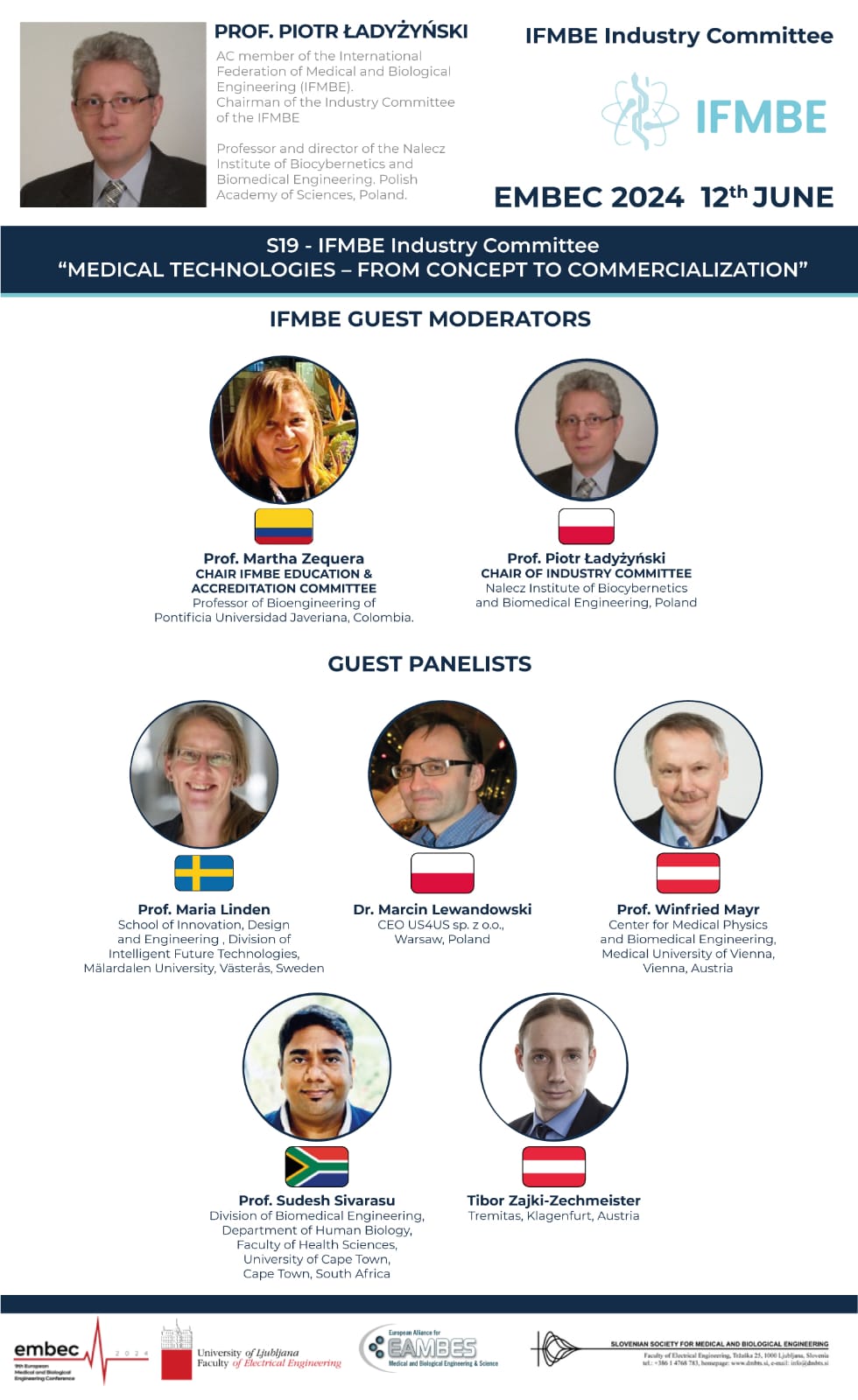
S20 – System design for biomagnetic applications using optically pumped magnetometers (Symposium)
Conveners/Organizers
Tilmann Sander, Daniel Baumgarten, and Urban Marhl
Description
Optically pumped magnetometers (OPM) are gaining in popularity for magnetoencephalography (MEG) and other biomagnetic applications such as the study of muscular activity (magnetomyography, MMG) and the characterization of magnetic nanoparticles (MNP). This interest in OPMs is due to advantages such as more spatial flexibility and lower maintenance costs in comparison to cryogenic SQUID sensors. To fully utilize these advantages current open loop SERF OPMs require optimized magnetically shielded rooms or adaptations of existing shielded rooms, which had been designed for SQUID sensors. The most common adaptation of existing shielded rooms consists of an active and gradient compensation coil system. With these adaptations, MEG and MMG can be performed in a much more participant friendly setup than before. New types of OPM sensors different from open loop SERF sensors alleviate some of the requirements for magnetic shielding and are therefore viable alternatives to open loop SERF OPMs. In this session, we aim to combine the following topics: Results for coil systems to improve shielding, design of MEG systems with different types of OPM sensors, MMG setups for medical application, and MNP studies aiming for unshielded operation.
S21 – The role of Large-Language Models and Generative AI in Health Technology Management [This session is joined with S23]
Conveners/Organizers
Alessio Luschi and Ernesto Iadanza
Description
Digital transformations are changing how services and processes can be automated and monitored. This is making a huge impact on how care, administrative and logistic processes are managed in hospitals and public health, especially due to the massive amount of heterogeneous sources of information, which are now available. Large Language Models (LLMs), semantic-web techniques, and Explainable Artificial Intelligence (xAI) can be used to mine and process real-world data, extracting valuable real-world evidence for innovative ways of managing health technologies, supporting knowledge management and health interoperability both for manufacturers and public health. Generative AI is a newer type of machine learning which functions to create synthetic data after learning the properties of real data. Artificially generated data can be used to expand and balance datasets, thus having the potential to revolutionise clinical research by safeguarding patient privacy as well as fostering evidence-based approaches, such as Evidence-Based Maintenance and Post-Market Surveillance (as outlined in the EU Medical Device Regulation 2017/745) of medical devices.
S22 – Tools, technologies and computing for point-of-care person-centered health and care delivery
Conveners/Organizers
Eleni Kaldoudi
Description
As health care is shifting from treating disease in hospitals to managing health and care delivery in a patient centered approach, robust, disruptive point-of-care health services are needed and, likely, are continuously emerging. This special session invites original, high quality, high impact papers on all topics that fall in the combination of innovative tools, technologies and computing for point-of-care person centered health and care delivery in well defined use cases, including but not limited to robotics, photonics, bio-sensing, artificial intelligence, real-time imaging, data analysis and interactive visual presentation for understanding and diagnosing diseases, facilitating risk-assessment, prevention, and carrying out medical interventions with improved patient safety. The submission can also address related enabling issues such as data quality, integration and interoperability, cybersecurity and data protection, clinical study design, big data collection and publishing, regulatory and ethics issues.
S23 – Uncertainty in integration of new medical technologies into health care systems [This session is joined with S21]
Conveners/Organizers
Rok Hren
Description
Integration of new medical technologies into healthcare systems is a multifaceted process as it requires careful consideration of numerous factors, such as the benefits, safety, and costs of these technologies. However, in case of medical devices (MDs) it is not always a straightforward task due to the limited availability of information on their efficacy, safety, costs, value for money, and affordability. Accordingly, the uncertainty surrounding the clinical outcomes and cost-effectiveness of MDs typically surpasses that of pharmaceuticals due to several factors. One key distinction is that MDs tend to have multiple applications, unlike pharmaceuticals which are often developed for specific indications. Furthermore, MDs frequently undergo product modifications throughout their lifecycle. In addition to device characteristics, such as reliability and accuracy, the effectiveness of MDs often depends on the skills, experience, and learning curve of the operators as well as the institutional environment in which they are used. Another major contributing factor to the higher uncertainty around MDs is the maturity of the evidence base regarding their clinical effectiveness during health technology assessments (HTAs). The HTA requirements for for MDs prior to launch are typically less stringent than for pharmaceuticals, and confirmatory randomized controlled trials (RCTs) may be lacking due to challenges in blinding and achieving randomization.
S24 – Wireless Wearable Networks for Physical Function Rehabilitation Monitoring
Conveners/Organizers
Željka Lučev Vasić, Ivana Čuljak, and Yueming Gao
Description
The aim of this special section is to bring together experts from various fields to explore the potential of wireless wearable networks in monitoring and enhancing the rehabilitation process. In rehabilitation monitoring various sensors are used, like breathing and heart rate measurement sensors, fatigue monitoring sensors (such as muscle impedance, sweat lactic acid, surface EMG signals), sensors for monitoring body positions, etc. Measurements of physiological parameters can be made using contact or contactless electrodes, and the electrodes can be a part of the sensor node or incorporated in smart textiles. Communication should be low power, such as Bluetooth LE or intrabody communication (IBC). All these sensors and communication interfaces are to be incorporated in a wireless sensor node for rehabilitation monitoring, which can take place at rehabilitation facilities, or in the home environment, posing different expectations on sensor network functionalities and features of the output signal. The prospective authors are invited to contribute to this special session with original and review papers on topics such as low power body area networks, intrabody communication (measurements, interfaces, modeling, applications), physiological sensor design and signal processing, bioimpedance measurements, extraction of features relevant for rehabilitation, etc.
S25 – IFMBE Education in BME Session: Challenges in Accreditation of Biomedical Engineering Programs in Latin America
Conveners/Organizers
Martha Zequera Diaz and Virginia Laura Ballarín
Description
The session is oriented towards exchanging the status of Biomedical Engineering (BME) education, particularly on the structure of BME programs in the Latin America Region. An invited panel of experts will discuss the possibility of harmonization of BME program in the region. The goal is to primarily strengthen student exchanges and build future global sustainable BME Education program.
Six special guests from different Latin America Regions will present insights into the transformation of the BME in their countries. They will delve into their distinct perspectives, challenges, and experiences within the field.
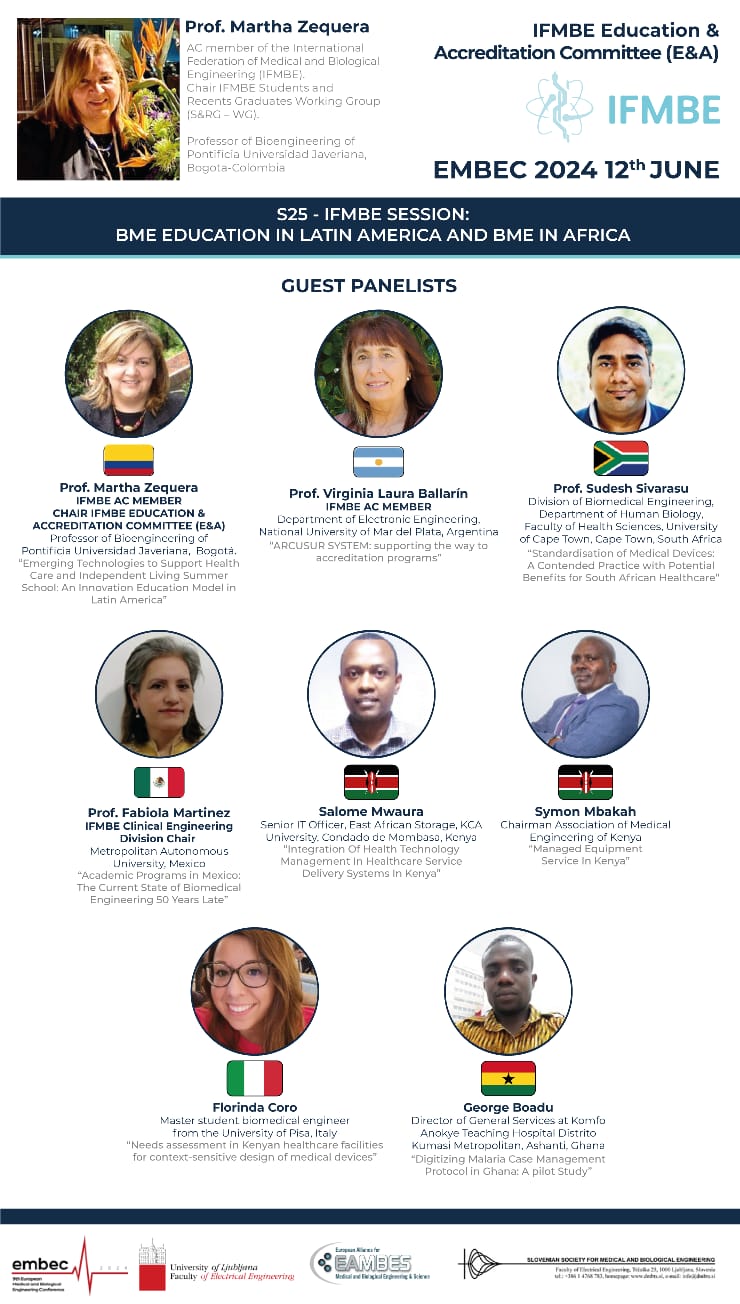
S26 – IFMBE Education in BME Session: Transformation of the BME Education in Asia Pacific Region
Conveners/Organizers
Martha Zequera Diaz and James Goh
Description
The session is oriented towards exchanging the status of Biomedical Engineering (BME) education, particularly on the structure of BME programs in the Asia Pacic Region. An invited panel of experts will discuss the possibility of harmonization of BME program in the region. The goal is to primarily strengthen student exchanges and build future global sustainable BME Education program.
Five special guests from different Asia Pacific Regions will present insights into the transformation of the BME in their countries. They will delve into their distinct perspectives, challenges, and experiences within the field.
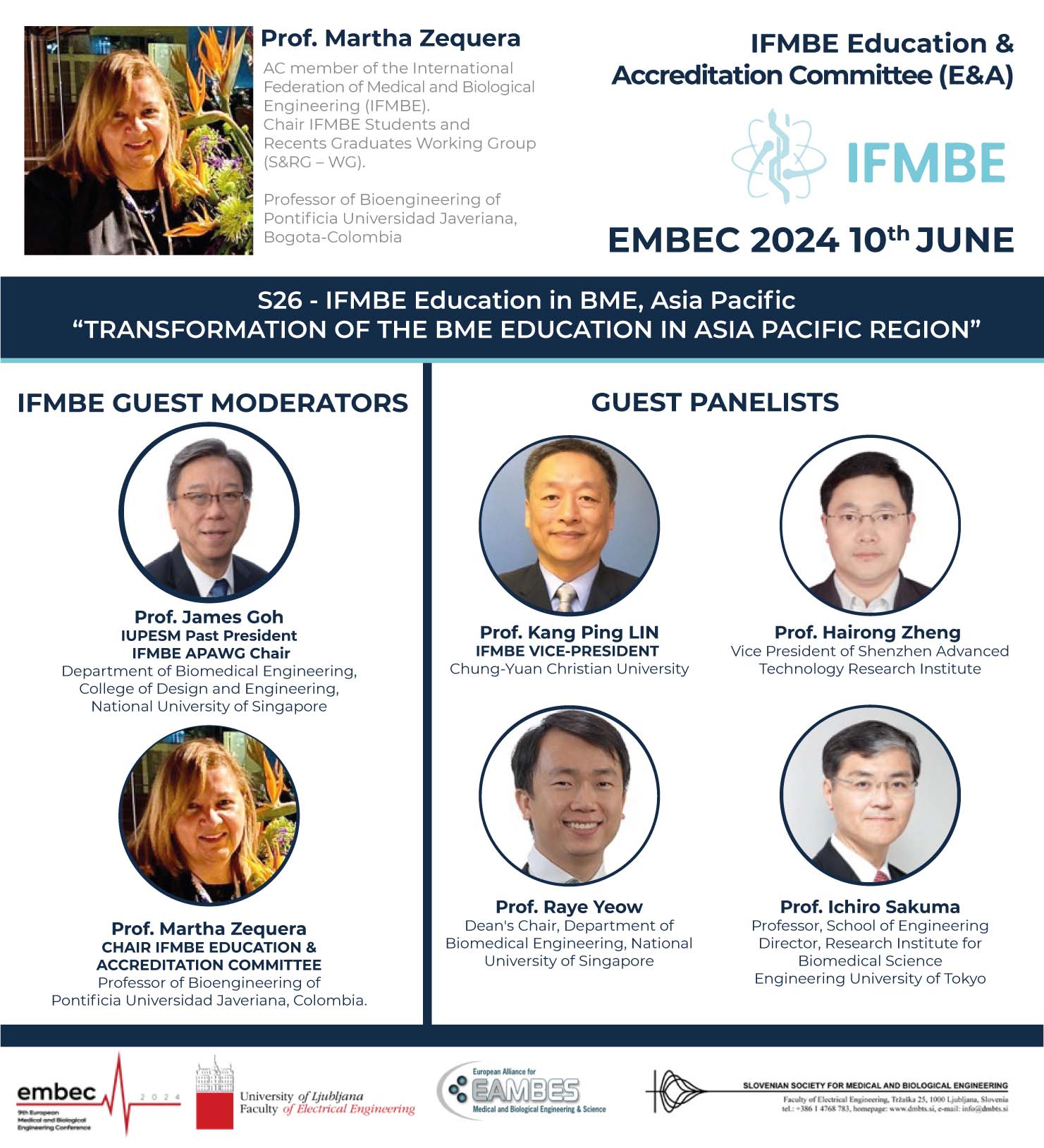
S27 – Perspectives of BME Education
Conveners/Organizers
Ratko Magjarević, Nicolas Pallikarakis and Martha Zequera
Description
The session is aimed to facilitate exchange of academic and professional experiences of a group of invited panelists in the field of Biomedical Engineering and Bioengineering. IFMBE distinguished academics will present their diverse perspectives of the future of development of biomedical engineering education. Professor from IFMBE affiliated BME societies will be invited to participate in this session.
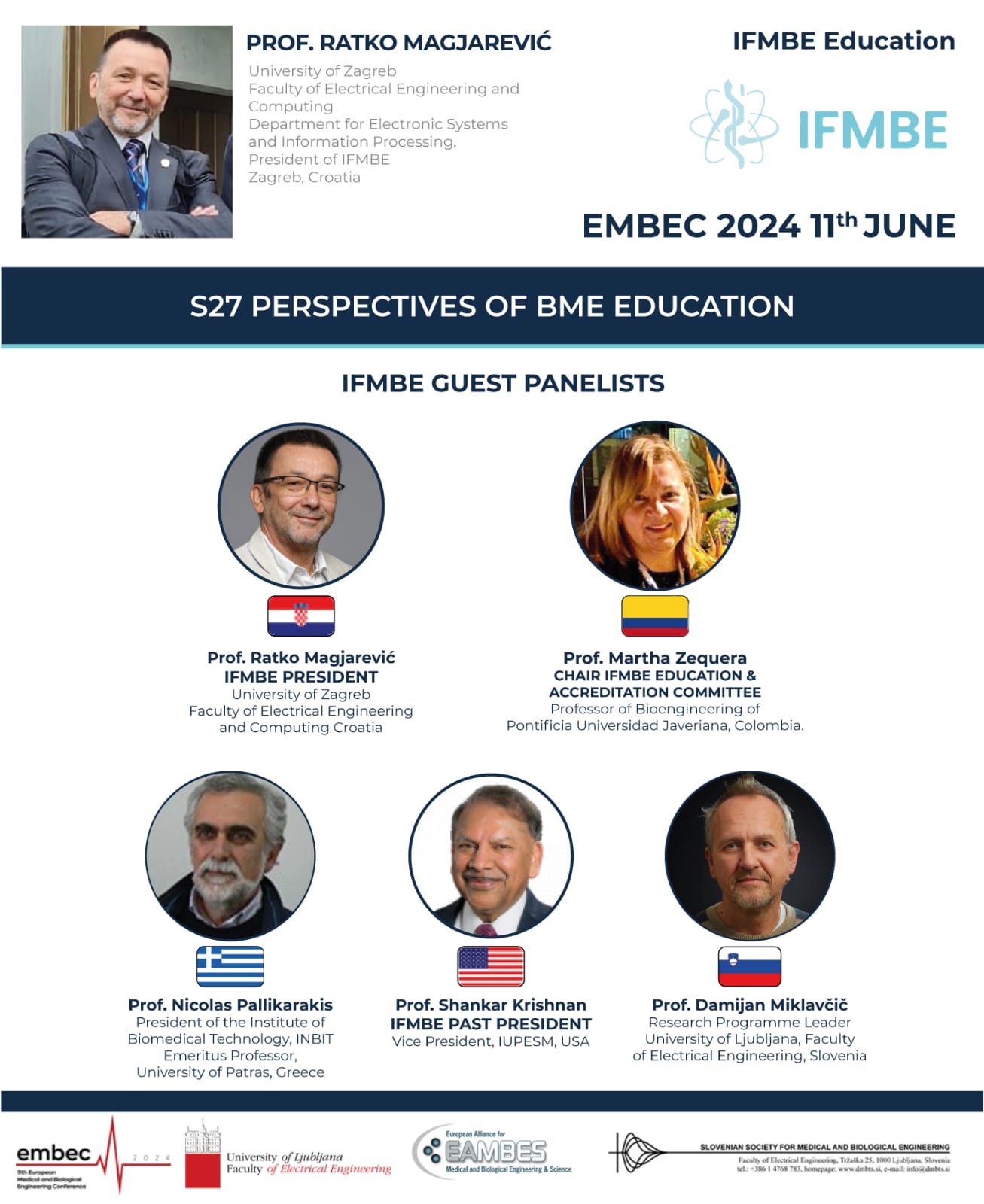
S28 – BME Education in Europe
Conveners/Organizers
Ratko Magjarević and Nicolas Pallikarakis
Description
In recent years, BME and BME education have been influenced by two major factors: the transition of health care to digital health care and the significant impact of the pandemic on the way of teaching in general, including in BME. In this session, we would like to explore how these factors influenced on core BME curricula, interdisciplinary topics, discipline-specific sub-specialties and students’ capacity for problem solving and communication. As a reference, we use the Tempus project on BME education in Europe conducted a decade ago.
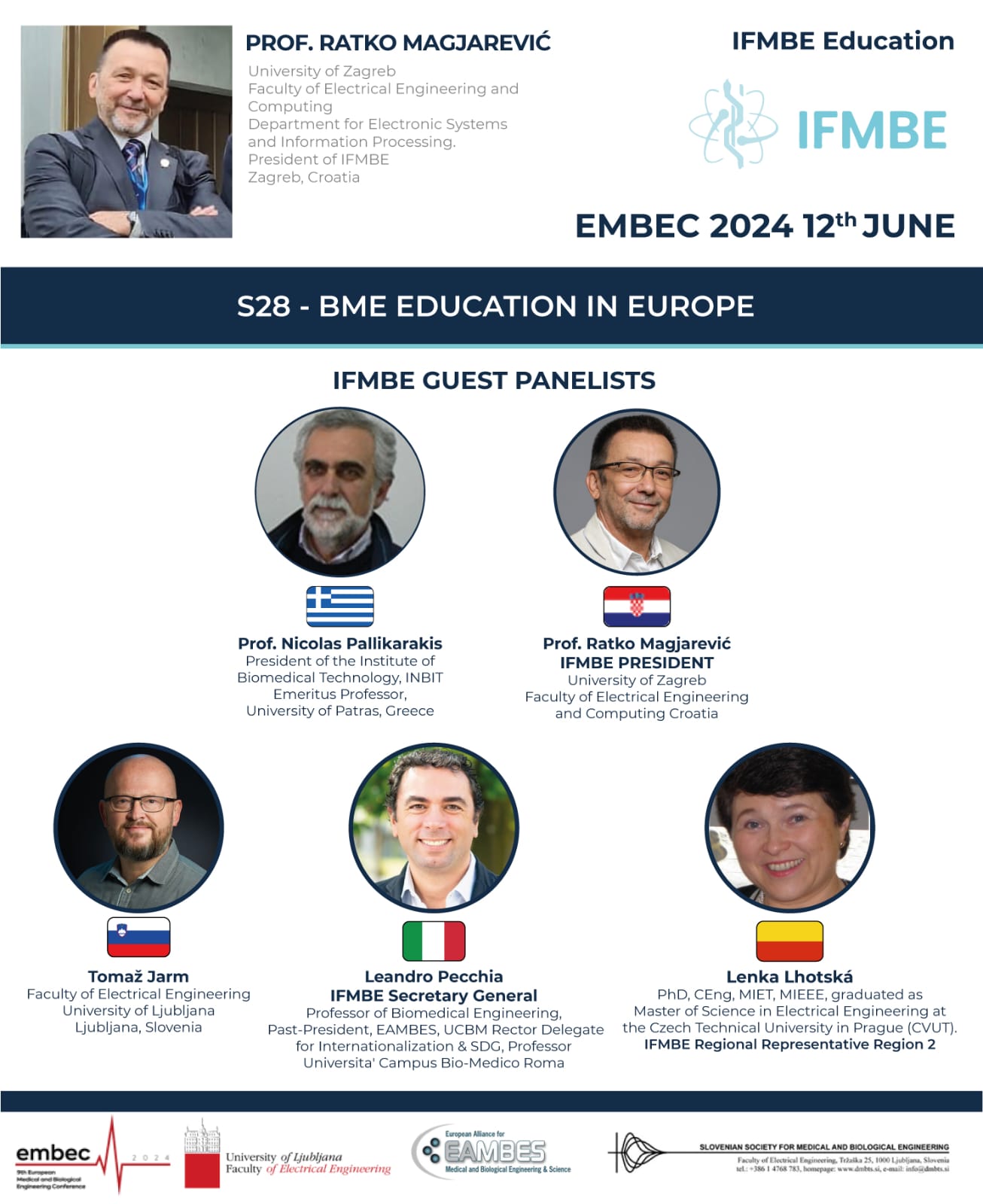
S29 – Presentation of WHO project – Update of CMMS and Inventory publication
Conveners/Organizers
Lejla Gurbeta Pokvić
Description
In this meeting session, we will be presenting our WHO project, focusing on the finalization of our publication. This book serves as an update to the CMMS (Computerized Maintenance Management System) and Inventory publications, providing comprehensive guidance on the medical equipment management information system in Low- and Middle-Income Countries (LMICs). Our aim is to offer practical, actionable insights to enhance the efficiency and reliability of medical equipment maintenance in these settings, ultimately improving healthcare delivery and patient outcomes.
